Henry Ward Beecher Collection (35 vols.)
Digital Logos Edition
This product has been transferred from Community Pricing to Pre-Pub. The actual funding level may be lower than it appears, which could delay production. The amount of funding still needed will be evaluated and updated soon.
Overview
Henry Ward Beecher was both the William Wilberforce and the Billy Graham of his day. Famed as America’s most powerful public speaker during his time and often noted for his uncompromising stance on the issues of his day, Beecher achieved social reform, led a dedicated Christ-serving congregation, and brokered international peace—all from behind the pulpit.
“The Shakespeare of the Christian pulpit.”—Charles Spurgeon
From as early as the 1840s, Henry Ward Beecher spoke out against slavery. His church was a noteworthy part of the Underground Railroad movement. Collections from his church were used to buy the freedom of many slaves, and he helped rally the Union to support Abraham Lincoln as Lincoln boldly signed the Emancipation Proclamation.
“The most influential man in America.”—Abraham Lincoln
Beecher was also outspoken for women’s voting rights—nearly half a century before the United States Legislature would introduce the Twentieth Amendment to the United States Constitution. Beecher worked with women’s rights leader Susan B. Anthony and his sister, famed writer Harriet Beecher Stowe, to convince the public of the equality of a woman’s political voice.
“The Hercules of American Protestantism.”—Walt Whitman
Now you can have his sermons, speeches, and writings accessible in your favorite Bible-study and research program. This collection contains several biographies of Henry Ward Beecher, Beecher’s famous biography of Jesus, and hundreds of his sermons, speeches, and orations—including his famous address at Fort Sumter and his eulogy for Abraham Lincoln.
The Logos advantage makes these volumes far more valuable than print copies. Seeing Beecher’s Bible references on mouseover and following his cross-references through your library make research faster and reading more fun. You can look up theological concepts and terms with just a click, or instantly search these volumes to find ideas or themes Beecher wrote or spoke on.
Key Features
- Hundreds of sermons from one of America’s most powerful and influential preachers
- Three biographies and multiple analyses of Beecher’s life works
- His popular biography, The Life of Jesus, the Christ, and his response to evolutionary theory
- His teaching on how to preach with conviction, eloquence, and charge
- A daily devotional with Scripture and meditations from Beecher, a topical book of quotations, and a book of his famous prayers
Praise for Henry Ward Beecher
His discourse sparkled with felicitous similes and metaphors (it is his strong suit to use the language of the worldly,) and might be called a striking mosaic work, wherein poetry, pathos, humor, satire and eloquent declamation were happily blended upon a ground work of earnest exposition of the great truths involved in his text. Whenever he forsook his notes and went marching up and down his stage, sawing his arms in the air, hurling sarcasms this way and that, discharging rockets of poetry, and exploding mines of eloquence, halting now and then to stamp his foot three times in succession to emphasize a point, I could have started the audience with a single clap of the hands and brought down the house. I had a suffocating desire to do it.
One of the greatest and most remarkable orators of his time was Henry Ward Beecher. I never met his equal in readiness and versatility. His vitality was infectious. He was a big, healthy, vigorous man with the physique of an athlete, and his intellectual fire and vigor corresponded with his physical strength. There seemed to be no limit to his ideas, anecdotes, illustrations, and incidents. He had a fervid imagination and wonderful power of assimilation and reproduction and most observant of eyes. He was drawing material constantly from the forests, the flowers, the gardens, and the domestic animals in the fields and in the house, and using them most effectively in his sermons and speeches.
—Chauncey M. Depew, former United States senator of New York
[President Lincoln] once remarked to the Rev. Henry M. Field, of New York, in my presence, that ‘he thought there was not upon record, in ancient or modern biography, so productive a mind, as had been exhibited in the career of Henry Ward Beecher!’
—Francis B. Carpenter, artist
Mr. Beecher revolutionized my theology by revolutionizing my life. I obtained through him a new experience of God, of Christ, of salvation, of religion: I began to see that Jesus Christ was what God eternally is . . . that salvation is life, and that Jesus Christ came into the world to give me life. . . . To Mr. Beecher I am indebted for a new interpretation of and a new impulse to the life of faith and hope and love.
—Lyman Abbot, theologian
Beecher’s influence extended far beyond religious and political matters. His irreverent and often iconoclastic opinions on science, psychology, art, entertainment, and popular culture helped liberate Americans from stifling prejudices and outworn conventions, and usher in modern patterns of thought. As one admirer wrote after his death in 1887, ‘Abraham Lincoln emancipated men’s bodies; Henry Ward Beecher emancipated their minds. The one delivered them from injustice; the other, from superstition.’
—The New York Times
One of the outstanding characteristics of Beecher, and one of the secrets of his many-sided genius, was his comprehensive, thorough-going, palpitant human quality. There were in him a tug of the cosmic, a touch of the human, a tone of the divine. . .
—Frederick F. Shannon, Homiletic Review, vol. 65
Product Details
- Title: Henry Ward Beecher Collection
- Volumes: 35
- Pages: 14,423
Individual Titles
- Oration at the Raising of “The Old Flag” at Sumter and Sermon on the Death of Abraham Lincoln by Henry Ward Beecher
- American Rebellion: The Speeches of the Rev. Henry Ward Beecher in Manchester, Glasgow, Edinburgh, Liverpool, and London by Henry Ward Beecher
- The Sermons of Henry Ward Beecher, First Series: September 1868–March 1869 by Henry Ward Beecher
- The Sermons of Henry Ward Beecher, Second Series: March–September 1869 by Henry Ward Beecher
- The Sermons of Henry Ward Beecher, Third Series: September 1869–March 1870 by Henry Ward Beecher
- The Sermons of Henry Ward Beecher, Fourth Series: March–September 1870 by Henry Ward Beecher
- The Sermons of Henry Ward Beecher, Fifth Series: September 1870–March 1871 by Henry Ward Beecher
- The Sermons of Henry Ward Beecher, Sixth Series: March–September 1871 by Henry Ward Beecher
- The Sermons of Henry Ward Beecher, Seventh Series: September 1871–March 1872 by Henry Ward Beecher
- The Sermons of Henry Ward Beecher, Eighth Series: March–September 1872 by Henry Ward Beecher
- The Sermons of Henry Ward Beecher, Ninth Series: September 1872–March 1873 by Henry Ward Beecher
- The Sermons of Henry Ward Beecher, Tenth Series: March–September 1873 by Henry Ward Beecher
- The Sermons of Henry Ward Beecher, New Series: September 1873–March 1874 by Henry Ward Beecher
- The Sermons of Henry Ward Beecher, New Series: March–September 1874 by Henry Ward Beecher
- The Sermons of Henry Ward Beecher, New Series: September 1874–March 1875 by Henry Ward Beecher
- The Sermons of Henry Ward Beecher, New Series: March–September 1875 by Henry Ward Beecher
- Prayers from the Plymouth Pulpit by Henry Ward Beecher
- The Life of Jesus, the Christ by Henry Ward Beecher
- Evolution and Religion, part 1 by Henry Ward Beecher
- Evolution and Religion, part 2 by Henry Ward Beecher
- Yale Lectures on Preaching, First Series: Personal Elements in Preaching by Henry Ward Beecher
- Yale Lectures on Preaching, Second Series: Social and Religious Machinery of the Church by Henry Ward Beecher
- Yale Lectures on Preaching, Third Series: Methods of Using Christian Doctrines in Preaching by Henry Ward Beecher
- Lectures to Young Men on Various Important Subjects by Henry Ward Beecher
- Familiar Talks on the Themes of General Christian Experience by Henry Ward Beecher
- Eyes and Ears by Henry Ward Beecher
- Sunshine in the Soul by Henry Ward Beecher
- Freedom and War: Discourses on Topics Suggested by the Times by Henry Ward Beecher
- Common Sense for Young Men on the Subject of Temperance by Henry Ward Beecher
- Morning and Evening Exercises: Selected from the Published and Unpublished Writings of Rev. Henry Ward Beecher by Lyman Abbot and Henry Ward Beecher
- Life Thoughts: Gathered from the Extemporaneous Discourses of Henry Ward Beecher by Edna Dean Proctor and Henry Ward Beecher
- One Thousand Gems from the Rev. Henry Ward Beecher by George D. Evans and Henry Ward Beecher
- A Biography of Rev. Henry Ward Beecher by William C. Beecher and Samuel Scoville
- Beecher: Christian Philosopher, Pulpit Orator, Patriot, and Philanthropist by Thomas W. Handford
- Henry Ward Beecher by Lyman Abbot

At 4:30 am on April 12, 1861, Confederate artillery opened fire on Fort Sumter, bombarding the fortified Union base with shells and mortar rounds. The American Civil War had begun. Two days later, on the afternoon of April 14, Major Robert Anderson surrendered Fort Sumter on the condition that his soldiers might give a 50 gun salute to the Union flag prior to its lowering and their retreat.
Four years later, at the end of the war and the quelling of the rebellion, Abraham Lincoln invited Henry Ward Beecher to give the primary address as “The Old Flag”—the very same flag that was lowered four years prior—was raised up again on Fort Sumter.
This volume contains his momentous speech from April 14, 1865, at Fort Sumter. Later that same evening, President Abraham Lincoln—only a few months into his second term as US President—was assassinated. In memory of this “martyr for liberty,” Henry Ward Beecher gave a stirring and unforgettable speech, which is also included in this volume.
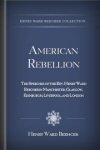
During the American Civil War, at the behest of Abraham Lincoln, Henry Ward Beecher travelled throughout Great Britain at public political meetings, giving passionate speeches to undermine Great Britain’s economic support for the South. Beecher travelled to Manchester, Glasgow, Edinburgh, Liverpool, and London, delivering impassioned orations to tumultuous political assemblies. These speeches contain not only Beecher’s orations, but the parenthetical interruptions—the moments of cheering, jeering, laughter, and applause of British assemblies during his actual oration. You’ll find that reading these historical and spiritual orations is like attending the wild British political assemblies in which they were first spoken in 1863.
. . . the world has heard no such eloquence since Demosthenes.
This minister has finished a more remarkable mission than any envoy who has represented us in Europe since Benjamin Franklin pleaded the cause of the young republic before the court of Versailles. Unaided by any official title, he has reached nobles, courtiers, cabinets, and the throne itself. His influence in breaking the courses of the rebellion can never be estimated.
—Oliver Wendell Holmes, The Atlantic Monthly
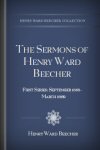
These 27 Sunday sermons of Henry Ward Beecher are a glimpse at Beecher as a powerful rhetorician and a masterful scholar of biblical interpretation and application. On practical topics ranging from repentance to generosity and theological topics from the Trinity to salvation, these sermons speak to everyone. Explore the words that earned him the honorific “most influential man in America” from the president of the same country.
The late Henry Ward Beecher was, take him all in all, the most remarkable preacher and orator of this generation. His fertility of mind was inexhaustible.
—New York Evangelist
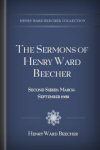
These 26 Sunday sermons of Henry Ward Beecher are a glimpse at Beecher as a powerful rhetorician and a masterful scholar of biblical interpretation and application. Designed to awaken moral feeling and strengthen Christian principles, these six months’ sermons provide courage and apologetics for the Christian church. Discover Beecher’s response to the rise of the Enlightenment and the growth of atheism in mainstream culture.
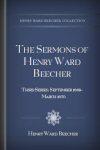
These 26 Sunday sermons of Henry Ward Beecher are a glimpse at Beecher as a powerful rhetorician and a masterful scholar of biblical interpretation and application. Especially expounding on the divine nature of Christ, the activity of the Holy Spirit, and the doctrine of the Trinity, these volumes cover a wide range of topics and still find themselves rooted in divinity.
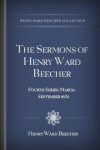
These 26 Sunday sermons of Henry Ward Beecher are a glimpse at Beecher as a powerful rhetorician and a masterful scholar of biblical interpretation and application. Beecher preaches heavily on spiritual warfare and Christian character in these six months, discussing the tricks of the enemy, the defenses of the Christian character, and the danger of sin on eternal souls.
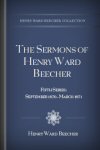
These 26 Sunday sermons of Henry Ward Beecher are a glimpse at Beecher as a powerful rhetorician and a masterful scholar of biblical interpretation and application. In these sermons, readers find consistent preaching with themes of God’s love and the work of Christ within us.
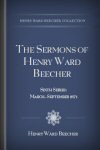
These 26 Sunday sermons of Henry Ward Beecher are a glimpse at Beecher as a powerful rhetorician and a masterful scholar of biblical interpretation and application. In these sermons, Beecher preaches on the conviction of the soul and the work of the Gospel. The majority of these sermons bring up the power of the Gospel in the changing of lives, and the requirement to be not just hearers of the Word, but also doers.
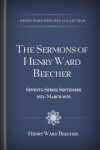
These 26 Sunday sermons of Henry Ward Beecher are a glimpse at Beecher as a powerful rhetorician and a masterful scholar of biblical interpretation and application. Each of these sermons is quite distinct, exposing an array of different topics Beecher preached during this six-month period. Many of these sermons display his concern for public affairs, such as the right of a woman to vote, the right of a woman to preach from the pulpit, and the corruption in politics during his time.
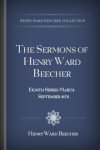
These 26 Sunday sermons of Henry Ward Beecher are a glimpse at Beecher as a powerful rhetorician and a masterful scholar of biblical interpretation and application. A few of these sermons concern themselves with eschatology and the theology of death and eternal life, and yet others address the Christian life. What is the “Christian life,” and how does one live it? Beecher’s preaching prepares the reader to live Christ’s mission not only in this life, but also in the next.
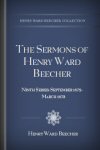
These 26 Sunday sermons of Henry Ward Beecher are a glimpse at Beecher as a powerful rhetorician and a masterful scholar of biblical interpretation and application. This volume of diverse homiletic topics covers the usual range of theological and practical sermons to be expected of Beecher. Dive right in to his preaching on love, liberty, and humility and discover the truth of his pulpit orations.
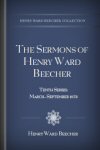
These 23 Sunday sermons of Henry Ward Beecher are a glimpse at Beecher as a powerful rhetorician and a masterful scholar of biblical interpretation and application. These sermons include expositions in salvation, self-discipline, mercy, instruction of children, and human reason, among many other topics.
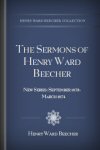
These 26 Sunday sermons of Henry Ward Beecher are a glimpse at Beecher as a powerful rhetorician and a masterful scholar of biblical interpretation and application. Discover Beecher’s vigorous and inspiring sermons to Plymouth Church in Brooklyn, which include lessons on spiritual manhood, working spirituality into the mundane tasks of life, and staying true to God during times of suffering and trial.
As one turns these wonderful pages, it is hard to think that the mind which speaks through them with such ever fresh power to interest, and often with such tremendous vitality and suasive strength, has ceased to act on earth.
—The Congregationalist
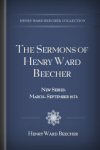
These 26 Sunday sermons of Henry Ward Beecher are a glimpse at Beecher as a powerful rhetorician and a masterful scholar of biblical interpretation and application. This six-month series explores the relationship of religion and government—particularly justice and righteousness in government officials, religious liberty exercised in churches, and the nature of truth and its relation to society.
These were delivered. . . during the time of Mr. Beecher’s deepest trouble, when, in the opinion of many, his preaching showed his ripest thought and deepest feeling.
—The Congregationalist
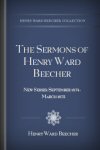
These 26 Sunday sermons of Henry Ward Beecher are a glimpse at Beecher as a powerful rhetorician and a masterful scholar of biblical interpretation and application. Taking previous themes even further during this six-month series, Beecher continues his sermons on the indwelling of Christ, the philosophy of the immortal soul, the mission of the church in society, government, and the world, and moral uprightness.
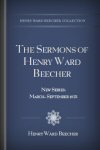
These final 26 Sunday sermons of Henry Ward Beecher are a glimpse at Beecher as a powerful rhetorician and a masterful scholar of biblical interpretation and application. Within these sermons, you’ll find lessons on the spiritual Christian life, the internal workings of the Holy Spirit, and the solidarity of Jesus as our foundation in all things.
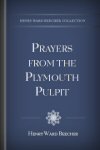
Over 300 pages of eloquently and passionately spoken petitions from Beecher’s years of preaching at Plymouth Church are recorded in this volume. The devotional practices of Beecher at the pulpit inspired generations of Christians nationwide—discover them whether you’re looking to deepen your personal prayer life or to liven your public prayer practices.
Many have remarked that Mr. Beecher’s prayers were often worth more than his sermons. . .
—The Congregationalist, vol. 86
Who that ever heard him pray can forget the impression? There were many among his parishioners who valued his ministry of prayer more than the message of the sermon.
—Andover Review
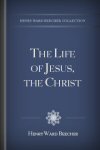
Beecher’s famous and well-researched biography of Jesus explores the environmental conditions, culture, and political atmosphere of Jesus’ life, clarifying things unfamiliar or assumed by contemporary readers of the four Gospels. He makes frequent reference to many of the theological and cultural works of his time, including the popular and insightful The Land and the Book, The Life of Our Lord upon the Earth, and Smith’s Bible Dictionary, among many other resources.
The book which the masses of the Christian world have been waiting for.
—Dr. Storrs, former pastor, Church of the Pilgrims, Brooklyn
A well-known English critic said that Beecher’s Life of Christ would be welcome to Christians, inquirers, skeptics, infidels, teachers, Bible classes, home circles, and intelligent readers of every name. That Mr. Beecher had put his best work in the first volume of the work, was evident to any critical reader, and the publishers gave it a frame worthy of the picture. Agents sold the book faster than it could be furnished.
—Thomas Wallace Knox
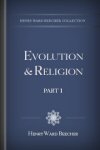
Beecher constructs a theological treatment of the theory of evolution, demonstrating that evolution is not mutually exclusive with God’s creation. Beecher lauds the theory of evolution, explaining that not only does it explain the mysteries of the scientific universe so well, but that in doing so it also reveals the genius and glory of the God who envisioned it all. The first part is a concise eight sermons exploring the relationship of evolutionary philosophy with the primary doctrines of evangelical Christianity.
These are very remarkable sermons, first for the general characteristics of the preacher—perhaps the greatest of living preachers, with a greater genius for oratory than any man of his time. The high level of metaphysical thought, popularly put, at which these discourses are sustained, is unique.
—The British Quarterly Review, vol. 83
The distinction between religion and theology is not new, but Mr. Beecher shows that it is wide and deep, and that religion must unload theology or sink with it. . . .
—Popular Science Magazine
It is twenty-five years since Henry Ward Beecher died, a man whose distinction is that he contributed to religious progress more than any other religious teacher of his time. . . . After Edwards, Hopkins, Channing, and Bushnell, he was the next great leader in the ethicizing of theology. . .
—James M. Whiton, Homiletic Review, vol. 65
He casts upon the great fundamental doctrines of the Church, in succession, the light of the Evolutionary theory; and those who felt assured before of their firm foundation, must yet confess that they take on new beauty and meaning under this light, while many will owe to this illumination no less than the renewal of a lost belief.
—Sacramento Record-Union
The spell of Mr. Beecher’s genius has never been more powerfully exerted.
—Living Church
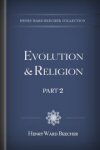
Beecher constructs a theological treatment of the theory of evolution, demonstrating that evolution is not mutually exclusive with God’s creation. Beecher uniquely finds a practical application for the integration of evolution into theology that brings both God’s church and the individual Christian into closer communion with him on a day-to-day level. Part two contains 18 sermons discussing the application of the evolutionary theories to practical aspects of religious life—Henry Ward Beecher’s favorite part of discussing evolutionary theory.
Mr. Beecher made theology reasonable. He showed us the progressive revelation of God. He took the sting out of the theory of evolution, and showed us that evolution was God’s way of doing things.
—Newell Dwight Hillis, Homiletic Review, vol. 65
The discourses are clear, sober, solid thought. Each link in the chain is complete and perfect in itself.
—Cornell Review
[Each sermon] is full and overflowing with stimulating thought, fresh views of great truths grown stale by monotony of iteration, inspiring impulses and strong mountings of devotion towards God, earnest benevolence and goodwill toward man, loyalty to Christ—and in fact a gospel of good sense and hopeful Christianity, wrought out of a reverent study of God’s ways of working in nature—physical social, mental, moral, and spiritual.
—Providence Star
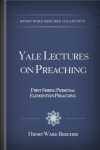
The Lyman Beecher Lectureship on Preaching has annually given lectures for over 140 years at Yale Divinity School. Established in 1871 by a gift from Henry W. Sage, esq. in memory of Lyman Beecher (Henry Ward Beecher’s father), the lecture series requires that the lecturer have demonstrated remarkable success in public Christian ministry. Notable lecturers have been William M. Taylor, Henry Clay Trumbull, and P. T. Forsyth. Henry Ward Beecher was asked to speak for the first three years of the lectureship. The first series was given in 1872 and reveals the key to Henry Ward Beecher’s success at public speaking and successful pastoring in preaching.
No other man could have combined so much of the genuine gospel method of teaching and preaching into one volume.
—Methodist Recorder
The sources of his extraordinary power are clearly set forth in these characteristic lectures.
—New York Observer
Every theological student, young minister, Bible class teacher, and laborer in mission work, will be profited by the study of this thoughtful and interesting book.
—The Episcopalian
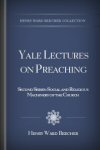
The Lyman Beecher Lectureship on Preaching has annually given lectures for over 140 years at Yale Divinity School. Established in 1871 by a gift from Henry W. Sage, esq. in memory of Lyman Beecher (Henry Ward Beecher’s father), the lecture series requires that the lecturer have demonstrated remarkable success in public Christian ministry. Notable lecturers have been William M. Taylor, Henry Clay Trumbull, and P. T. Forsyth. Henry Ward Beecher was asked to speak for the first three years of the lectureship. The second series was given in 1873 and explores those social aspects of the church that lend themselves to powerful preaching, such as the use of the worship set, the content and direction of weekly prayer meetings, and the conduct and philosophy of church revivals.
The secrets of successful pulpit work as explained by one of its masters.
—Baltimore Presbyterian
No preacher or Christian worker but will benefit himself and others by a knowledge of the principles and methods of one of the foremost preachers of the day.
—Sunday School Times
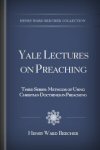
The Lyman Beecher Lectureship on Preaching has annually given lectures for over 140 years at Yale Divinity School. Established in 1871 by a gift from Henry W. Sage, esq. in memory of Lyman Beecher (Henry Ward Beecher’s father), the lecture series requires that the lecturer have demonstrated remarkable success in public Christian ministry. Notable lecturers have been William M. Taylor, Henry Clay Trumbull, and P. T. Forsyth. Henry Ward Beecher was asked to speak for the first three years of the lectureship. The third series was given in 1874 and explores the Bible and finding practical application out of general theological and philosophical doctrines.
[Henry W. Beecher] gave the Lyman Beecher Lecture series at Yale, of which, when David Swing laid down the last volume, he said, ‘They may as well close the series. Everything has been said that can be said.’
—Newell Dwight Hillis, Homiletic Review, vol. 65
We know of no dozen treatises on the preacher’s work which contain so much of sensible and valuable instruction as is compressed into this little volume.
—New York Independent
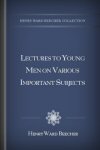
This volume provides nine sermons on the stumbling blocks of the youth of his age—seven of which are among Beecher’s earliest writings. These sermons explore the nature of temptation and enticement, the ways in which the moral decision isn’t always obvious, and the key to discerning evil when it puts on its disguise of innocence. Beecher addresses idleness, dishonesty, sexuality, gambling, vulgarity, and the proper place for amusement and the pursuit of happiness.
Mr. Beecher sketches character with a masterly hand; and the old, as well as the young, must bear witness to the truth and fidelity of his portraits. I would recommend the book to the especial attention of those for whom it was designed, and hope that the patronage extended to this may encourage the author to make other efforts through the press for the promotion of enlightened patriotism and sound morals.
—William H. McGuffey, professor, Woodward College
I know of no work so admirably calculated, if read with attention, to lead young men to correctness of thought and action; and I earnestly recommend it to the study of every young man who desires to become eminently respectable and useful.
—Honorable John McLean, Judge of the Supreme Court of the United States
. . . we were agreeably surprised in looking over the book before us. The subjects, though many of them are commonplace, are important, and handled in a masterly manner. The author shows himself acquainted with the world, and with human nature in all its varying phases. He writes as one who has learned the dangers and temptations that beset the young from personal observation, and not from hearsay.
—The Daily Cincinnati Gazette
It is an excellent book, and should be in the hands of every young man and of many parents. . . . this work will open their eyes and place them on their guard. It is written in a popular, captivating style and is nearly printed. It goes right at the besetting sins of the age, and handles them without gloves. It ought to be extensively circulated.
—The Baptist Cross and Journal
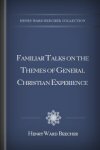
The talks in this volume were given at Henry Ward Beecher’s weeknight prayer meetings. Colloquial rather than oratory, these discourses reveal more of Beecher’s personality and off-the-cuff thought and speech. These 48 talks cover a wide variety of personal and intimate topics Beecher and his church addressed in this small-group setting. The first talk is Beecher’s farewell to his prayer group before he left for the United Kingdom on his diplomatic mission on behalf of Abraham Lincoln, which is immediately followed by his first talk upon his return, and his personal thoughts on the trip and on England itself.
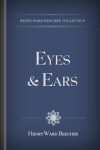
These articles were written under the title of “Thoughts as they Occur by one who keeps his Eyes and Ears open,” in a weekly column for the New York Ledger. Written in a completely humble and intimate style (compared with his usual sermons or orations), these articles expose the day-to-day appreciation of the little things—of art, of nature, and of country.
If they serve to inspire a love of Nature, or an enjoyment of rural occupations, or to form a kindly habit of judging men and events, or if they even serve only to enliven the tedium of sickness, or while away the hour with innocent amusement, they will answer the author’s expectations.
—From the foreword
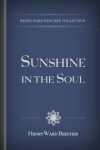
These collected writings, addresses, lectures, and sermons were pulled together from many public events over the course of many years. Written simply and elegantly, they cover a wide range of subjects in the popular rhetoric Beecher was made famous for. With 65 addresses, letters, and sermons not repeated in any other volume, Sunshine in the Soul is the completely reedited and revised edition of Beecher’s New Star Papers: Views and Experiences on Religious Subjects published almost 20 years prior. These writings are notably more personal and familiar than Beecher’s usual sermons, yet still display the power of his oratory style.

These 18 discourses are a theological look at national duty and democracy in the United States. Beecher expresses his uncompromising Christian principles against slavery: he articulates the Christian responsibility to speak against slavery and work morality into the lawmaking practices of his age. His discourses explore Christianity in the national government, the philosophies of liberty and duty, and how the Christian church should respond to injustice in the government.
Has all the well known characteristics of the author, brilliancy, power, pathos, fire, thunder, truth—clearly and strongly put—sophistry, unconsciously intermingled, politics, religion, blessing, cursing. Anybody who has heard Henry Ward Beecher, will hear him and see him in reading these discourses; but to anybody who has not, the book will convey about as clear an idea of the man and his oratory as a painting can of a thunder storm.
—The Boston Review, vol. 4
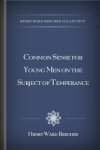
This short volume is a long sermon outlining the spiritual, social, and economic virtues of sobriety and establishing the evils of the same kind. Preached on February 5, 1871, and then published for distribution by the National Temperance Society and Publication House, this sermon reached thousands of readers and fueled the temperance movement of the late nineteenth century, setting the stage for the passing of the Eighteenth Amendment several decades later.
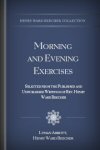
This 366-day devotional was compiled by Lyman Abbott, a like-minded contemporary and co-minister of Henry Ward Beecher’s; it pulls together Bible verses and long, contemplative quotations from all of Beecher’s writings, public and private. It has devotional entries for morning and evening in each day of the 366-day year, with devotional entries not ignoring holidays or anniversaries of major events. With the pragmatic and provocative words of Beecher supplementing the eternal words of the Bible, this devotional is an ideal tool for supplementing any morning or evening devotional.
A choice volume of devotional readings.
—Bibliotheca Sacra and Theological Review, vol. 28
Varied and excellent and often striking and beautiful are the thoughts here presented. . .
—The American Presbyterian Review
This volume exhibits Mr. Beecher in his best aspects. . . . We do not wonder that such glowing and truthful eloquence as everywhere gushes and brightens through these pages attracts and charms the multitude. Christ is in it a present power to help and heal. God is not here a doctrine, but a presence, filling the Universe, and breathing over the heart and drawing humanity toward heaven. . . . The volume is a treasury of genius, where manly sense and splendid fancy clothe their thoughts and images in words strong and striking and beautiful.
—The Church Review, vol. 22
Lyman Abbott (1835–1922) was an American Congregationalist pastor and writer. He studied law at New York University and was admitted to the bar association in 1856, but soon left after discovering a passion for theology. He pursued a doctorate of divinity from Yale, and was ordained a minister in the Congregational church in 1860. He succeeded Henry Ward Beecher at Plymouth Church in 1888. A well-published writer of over 20 books, he spent much of his time editing for The Christian Union (later renamed The Outlook), for which he was the editor-in-chief for many years.
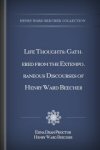
One of the earliest publications of Henry Ward Beecher’s sermons and lectures, this volume was originally printed and published without Beecher’s consent or knowledge. Compiled by a diligent note-taker in his congregation, these excerpts and quotations of Beecher’s sermons were edited and revised by Beecher in a later edition. This edition contains the unedited excerpts of transcriptions of his sermons, lectures, and talks.
Every page is covered with sentences full of life—rich, deep, strong, beautiful. You will search it vainly for aught that’s dull. . . . Taking this book as a whole, we can only say the like of it will not soon occur again, unless we have more of Beecher’s Life Thoughts.
—The Evangelical Magazine
They are pregnant with celestial fire, rich in suggestive and original thought. Here we find nuggets of gold and gems of the first water. . . . Beecher is not a model, but he is better; he is capital, available capital on which others may draw, and send what they draw into currency in thoughts and words that will do the world a vast deal of good.
—The London Press
There is not a dull or unmeaning sentence in it; but it is teeming with beauty, pathos, and sublimity.
—Zion’s Advocate
Edna Dean Proctor (1827–1923) was a teacher, a poet, and a member of Henry Ward Beecher’s congregation. Originally from New Hampshire, she was a nationally recognized poet in the United States, having written and published hundreds of poems, through which she outright supported the Union cause during the US Civil War. She also wrote for various national papers and periodicals.
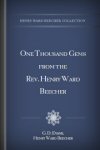
With exactly 1,000 extracted and self-contained thoughts on equally as many topics, this volume gives readers unlimited ability to find relevant quotations from Henry Ward Beecher on any topic he spoke or wrote on. Generously indexed with over 500 pages, these gems were selected by British publishers to make Beecher’s works more accessible in Great Britain, where his popularity and respect grew into a devoted following.
Perhaps no preacher of modern times has said so many wise and good things as Henry Ward Beecher, or said them so well. His sermons abound with passages of racy description, of penetrating exposition, of rhetorical brilliancy, and of fervent practical urgency. Mr. Beecher’s habits of preparation make this very remarkable. . . . Mr. Evans has culled out of the reported sermons of this great preacher a thousand ‘Gems.’ They are full of wisdom, depth, and beauty.
—The British Quarterly Review, vol. 54
. . . this volume, of more than 500 pages, while it far surpasses its predecessors in bulk, does not fall below them in quality.
—The London Quarterly and Holborn Review, vol. 35
There is not a dull or unmeaning sentence in it; but it is teeming with beauty, pathos, and sublimity.
—Zion’s Advocate
George D. Evans attended Metropolitan Tabernacle College and was pastor of Upton Chapel in London. He was a contemporary of Charles Spurgeon, who spoke on occasion at his church.
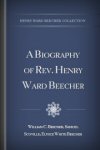
Chronicling Henry Ward Beecher’s life and immediate family history, William Beecher (his son) and Samuel Scoville (his son-in-law) compile a complete biography of the long life of Henry Ward Beecher, finishing a task already started by the man himself.
Over 600 pages intimately explore his life—from humorous accounts of his childhood to the difficult account of his court trial in his later years. Discover the events that shaped Beecher and made him one of America’s most influential figures.
The execution of the work is on the whole praiseworthy. Diligence, candour, and a high moral tone are everywhere discernible. . . . we heartily commend this volume to the attention of our readers for the light it throws on the character and attainments of one of the greatest preachers of the world, who was at the same time one of the greatest public men of the United States. . .
—The Critical Review of Theological and Philosophical Literature, vol. 1
We have here a remarkable book about a remarkable man. A book which certainly presents a solid opportunity for doing full justice to the renowned preacher of Brooklyn. . .
—The London Quarterly and Holborn Review, vol. 73
William Constantine Beecher (1849–1928) was Henry Ward Beecher’s second surviving son.
Samuel Scoville (1834–1902) was Henry Ward Beecher’s son-in-law, married to his daughter Harriet Eliza Beecher. Much like his father-in-law, he was a pastor in New York.
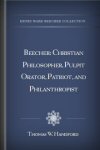
A concise and leisurely biography of Henry Ward Beecher, Beecher: Christian Philosopher, Pulpit Orator, Patriot, and Philanthropist is essential to studying Beecher’s life. Written so that those who have never met Beecher would get as close an encounter with the man as possible, the volume lends itself to its mission by increasing readability through brevity, and with its pages filled with excerpts from his sermons, writings, and orations, the reader may easily imagine sitting in a pew at Plymouth Church, listening to his passionate prayers or his convicting sermons.
As a pulpit orator he was during life the peer of any living, and his utterances will go on converting men, and fitting them for earth and heaven. As a patriot, loving his country, and willing to make any sacrifice for its sustenance and upbuilding, he was at all times conspicuous.
—Chicago Inter Ocean
It is much for a man worthy of a biography that he should fall into the hands of a congenial spirit, and that the biography should be a labor of love.
—Chicago Herald
Thomas W. Handford was a prolific biographical writer during the nineteenth and early twentieth centuries, having written biographies for Rev. Charles Spurgeon, Admiral George Dewey, President Grover Cleveland, President Theodore Roosevelt, William Ewart Gladstone, and Queen Victoria. He also edited and translated children’s stories, fairytales, and lesson books.
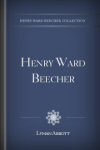
An intimate and friendly biography and character study of Henry Ward Beecher by his close friend Lyman Abbott, this volume closely follows Beecher’s public life—from the pulpit to the politics. Lyman not only addresses the actions, writings, and events in Beecher’s life, but with detail shares the decision-making process behind Beecher’s choices and the public response to Beecher’s life as pastor, preacher, author, editor, reformer, and lecturer. This volume includes appendixes which feature Beecher’s analysis of Romans 7 and his lengthy theological profession of faith.
A volume of considerable size. . . some people would call it a Life; Dr. Abbott calls it a Portrait; not ‘a record of achievements, but a personal introduction to the man.’ . . . There can be no question but that Mr. Beecher’s influence has mingled very largely in the moral, political, and religious life of the United States for at least the last twenty-five years. Dr. Abbott has been acquainted with him for nearly thirty years.
—The Literary World, vol. 27
Lyman Abbott (1835–1922) was an American Congregationalist pastor and writer. He studied law at New York University and was admitted to the bar association in 1856, but soon left after discovering a passion for theology. He pursued a doctorate of divinity from Yale, and was ordained a minister in the Congregational church in 1860. He succeeded Henry Ward Beecher at Plymouth Church in 1888. A well-published writer of over 20 books, he spent much of his time editing for The Christian Union (later renamed The Outlook), for which he was the editor-in-chief for many years.
About Henry Ward Beecher

Henry Ward Beecher (1813–1887) was the seventh child of Lyman Beecher, a well-respected and widely-known preacher and pastor, and of Roxana Foote Beecher, an artist and granddaughter of Revolutionary War officer General Andrew Ward. His siblings included woman’s rights activist Isabella Holmes Beecher Hooker, minister Charles Beecher, famed writer Harriet Beecher Stowe, and Edward Beecher, former president of Illinois College, editor of The Congregationalist, and antislavery leader.
Henry Ward Beecher studied at Amherst College and Lane Seminary. After seven years of education, he had a humble beginning as a pastor at poorer churches in Illinois until he was invited to speak at the newly-formed Plymouth Church in Brooklyn. From this pulpit, he campaigned against slavery, supported women’s suffrage, championed temperance, and drew the ear of the entire nation.
When, in 1854, the Kansas-Nebraska Act was passed and the Missouri Compromise repealed, Plymouth Church paid to ship rifles to antislavery settlers in Kansas and Nebraska in crates marked “Bibles,” famously making them known as “Beecher’s Bibles.” His church was also a safe haven along the Underground Railroad, and he would regularly hold faux auctions to buy the freedom of slaves with donations from his congregation.
Beecher was a voice among many pressuring President Abraham Lincoln to sign the Emancipation Proclamation. Once the Civil War erupted, President Lincoln sent Beecher on a mission to Great Britain, to address the political councils to keep Great Britain out of trade with the Confederate South and out of the war.
In 1872, Victoria Woodhull accused Beecher of committing adultery with Elizabeth Tilton, the wife of his best friend, in one of America’s biggest public scandals. The result was several trials, lawsuits, and rifts in family and society. Beecher’s wife stood by his side and maintained his innocence throughout the ordeal.
Henry Ward Beecher passed away in March of 1887 after suffering a stroke. Brooklyn declared it a day of mourning, the state legislature recessed, and national figures (including President Cleveland) sent letters of condolence. He was survived by his wife and only four of his eleven children.